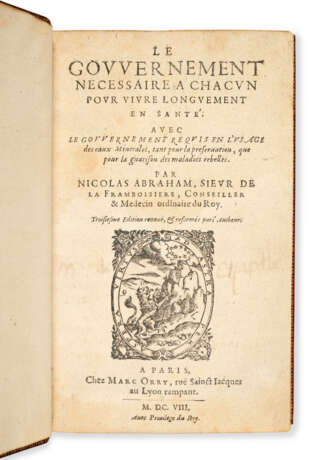ID 921656
Lot 131 | LA FRAMBOISIÈRE, Nicolas-Abraham (1560-1636).
Estimate value
€ 800 – 1 200
Le Gouvernement necessaire à chacun pour vivre longuement en santé. Paris : Marc Orry, 1608.
Un des plus anciens traités de diététique français. Troisième édition, en partie originale. Médecin des rois Henri IV et Louis XIII, Nicolas de La Framboisière est l'instigateur, en 1597, du premier service d'ambulances militaires en France en tant que médecin-chef de l'armée. À la fin de la Renaissance, sous l'influence d'Ambroise Paré, la science médicale en vient à distinguer trois pratiques : chirurgie, pharmacie et diététique. Ainsi enregistre-t-on l'importance croissante que revêt cette dernière, exprimée ici en langue vulgaire. Le discours alimentaire ne se borne pas à l'hygiène ; le premier livre traite de l'alimentation. Même si l'essentiel n'est pas la saveur des aliments mais leur consistance et leur digestibilité, la lecture n'en est pas moins délectable. Les huîtres, par exemple : on les fait cuire “sur le grill dans leurs escailles, y adjoutans du beurre & quelque peu de poyvre pour exciter l'appétit de Vénus.” Vicaire, 2 ; Cagle, 258 (édition de 1600) ; Céard, La diététique dans la médecine de la Renaissance in, Pratiques et discours alimentaires à la Renaissance, 1982, pp. 21-36 ; Dictionnaire de biographie française XIX, 1995, 229.
In-8 (169 x 102 mm). Illustré d'un portrait de l'auteur gravé par Léonard Gaultier. Enrichi d'un portrait de l'auteur gravé à l'eau-forte par Thomas de Leu, retenu pour l'édition originale en 1600, encarté en début d'ouvrage (restauration en marge du feuillet Aa1, trou affectant le feuillet x2, coin supérieur déchiré aux cahiers Y et Z, rares taches éparses). Etiquette du libraire Théophile Belin. Reliure du XIXe siècle : maroquin rouge, triple filet doré encadrant les plats, dos à nerfs orné, double filet sur les coupes, dentelle intérieure, tranches dorées sur marbrures.
Provenance : L. (?) Bethune (ex-libris manuscrit daté 1614, p. 304) ; M. de la Chapelle (ex-libris manuscrit d'une écriture du XVIIIe siècle en partie effacé)
Third edition of one of the oldest French treatises on dietetics, this copy in a fine 19th-century red morocco binding.
| Place of origin: | Western Europe, France, Europe |
|---|---|
| Auction house category: | Printed books |
| Place of origin: | Western Europe, France, Europe |
|---|---|
| Auction house category: | Printed books |
| Address of auction |
CHRISTIE'S 9 Avenue Matignon 75008 Paris France | ||||||||||||||
|---|---|---|---|---|---|---|---|---|---|---|---|---|---|---|---|
| Preview |
| ||||||||||||||
| Phone | +33 (0)1 40 76 85 85 | ||||||||||||||
| Fax | +33 (0)1 40 76 85 86 | ||||||||||||||
| Conditions of purchase | Conditions of purchase | ||||||||||||||
| Shipping |
Postal service Courier service pickup by yourself | ||||||||||||||
| Payment methods |
Wire Transfer | ||||||||||||||
| Business hours | Business hours
|





